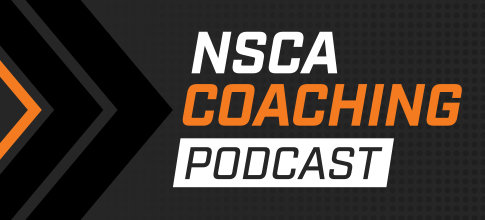NSCA’s Coaching Podcast, Episode 32: Bob Alejo
by Scott Caulfield and Bob Alejo
Coaching Podcast
June 2018
Bob Alejo, Director of Sports Science at Power Lift, talks to the NSCA Head Strength and Conditioning Coach, Scott Caulfield, about how Bob got into Strength and conditioning when the field was in its early stages of development. Bob shares his experience and gives advice on how to succeed in the strength and conditioning field.
Bob Alejo, CSCS, RSCC*E, has been the Director of Sports Science at Power Lift since July 2017. From 2011 – 2017 he was the Director of Strength and Conditioning for the Oakland Athletics Major League Baseball (MLB) team, a position he also held from 1993 – 2001. Prior to rejoining the Oakland Athletics, Alejo was the Director of Strength and Conditioning at the University of California, Santa Barbara from 2005 – 2008. From 1984 – 1993, Alejo served as a strength and conditioning coach at the University of California, Los Angeles, where he worked with 23 men’s and women’s teams.
Follow Bob on Twitter: @Coach_Alejo | Find Scott on Twitter: @scottcaulfield
Show Notes
“I couldn’t wait to get up in the morning and I hated going home because you had so much fun being around that kind of energy.” 6:57
“Buy-in from athletes didn’t happen the first day, and it really didn’t happen the first few years, but as time went on the guys who were lifting kept lifting and they got better at that because there was someone really driving it.” 15:28
“I feel like if I was to put my hand on…a philosophy or method that we used that no one else did was that we lifted as heavy as we could all the time.” 18:36
“You have to do what suits your facility, what suits your athletes and what you can get done that’s going to create a stimulus and help them get better.” 19:55
“The sets and reps are the easiest things that you’ll ever do. It’s the stuff that you do outside of it that make the sets and reps come to life.” 21:09
“It’s a little bit different on how you get there, but the qualities of the coach themselves, I think are as relevant as they were [in the past]. I think you have to be able to work with people and you have to be able to work with different socioeconomic backgrounds.” 22:14
“We’re all selling something. In our case we’re selling our program, we’re selling my integrity that you’re going to follow.” 22:39
“Run your weight room like a business because it is … You have to have a well-structured, organized program and that doesn’t mean necessarily the weight training. It means: how’s your staff act; what kind of personality do you want to represent; what kind of image are you going to portray?” 23:14
“Be careful with what you say or what you write because somebody might believe it.” 53:36
“I think scholarly work is important because, first of all, it teaches you how to speak … You put your thoughts together, you order them, you learn how to present it to people and you also learn how to write and inform somebody who doesn’t know what you know.” 55:50
“If it takes you 100 words to explain something that should take 20, then you probably don’t know what you’re talking about.” 56:54
Reporting Errors: To report errors in a podcast episode requiring correction or clarification, email the editor at publications@nsca.com or write to NSCA, attn: Publications Dept., 1885 Bob Johnson Dr., Colorado Springs, CO 80906. Your letter should be clearly marked as a letter of complaint. Please (a) identify in writing the precise factual errors in the published podcast episode (every false, factual assertion allegedly contained therein), (b) explain with specificity what the true facts are, and (c) include your full name and contact information.
- Privacy Policy
- Your Privacy Choices
- Terms of Use
- Retraction and Correction Policy
- © 2026 National Strength and Conditioning Association
